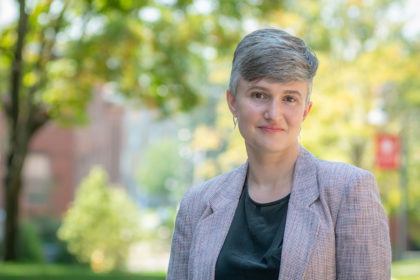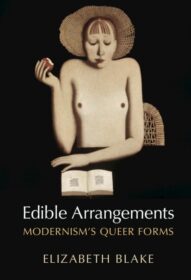Challenge. Change. Podcast
Cookbooks and queer theory
 When English Professor Elizabeth Blake opened “The Alice B. Toklas Cook Book,” she was captivated by more than the recipes. The pages are rife with gossip and stories about artists in modernist Paris. The cookbook is a theoretical representation of the value of food, the value of art, and queer life. It was published in 1954, after the death of Gertrude Stein, Toklas’s life partner.
When English Professor Elizabeth Blake opened “The Alice B. Toklas Cook Book,” she was captivated by more than the recipes. The pages are rife with gossip and stories about artists in modernist Paris. The cookbook is a theoretical representation of the value of food, the value of art, and queer life. It was published in 1954, after the death of Gertrude Stein, Toklas’s life partner.
Blake has spent a decade researching the intersection of queer theory, modernist studies, and food studies after finding inspiration in Toklas’s recipes and stories. Her new book, “Edible Arrangements: Modernism’s Queer Forms,” is the first scholarly monograph to combine the three subjects.
 “I think about the way structures of nutrition and structures of heteronormativity mimic each other — we’re taught that we’re supposed to eat certain things at breakfast, lunch, and dinner, all of which are culturally specific,” Blake says. “Similarly, our understanding of how sexuality operates is culturally specific and prescribed. What I’m interested in is the way modernist writers think about transgression in terms of eating, which invites us to think about transgression in terms of sexuality.”
“I think about the way structures of nutrition and structures of heteronormativity mimic each other — we’re taught that we’re supposed to eat certain things at breakfast, lunch, and dinner, all of which are culturally specific,” Blake says. “Similarly, our understanding of how sexuality operates is culturally specific and prescribed. What I’m interested in is the way modernist writers think about transgression in terms of eating, which invites us to think about transgression in terms of sexuality.”
Blake recommends Francesca Ekwuyasi’s “Butter Honey Pig Bread” and Rabindranath Tagore’s “The Hungry Stones” to anyone interested in exploring the ways literature invites readers to think about food and the body.
Challenge. Change. is produced by Andrew Hart and Melissa Hanson for Clark University. Listen and subscribe on Spotify or Apple Podcasts. Find other episodes wherever you listen to podcasts.


